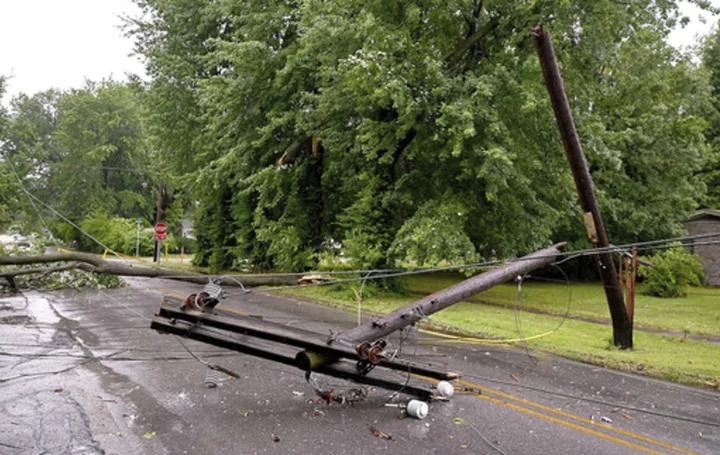INDIANAPOLIS (AP) — The nation’s midsection is heading into the July Fourth weekend and instead of enjoying the start of summer people are facing smoky haze, high temperatures and powerful derecho winds that knocked out power to hundreds of thousands of residents.
Utility crews were scrambling Friday to restore electricity after a storm front moved across Illinois and Indiana on Thursday packing winds more than 70 miles (112 kilometers) an hour at times.
The storm caused widespread damage to trees and buildings in the central parts of both states from the Mississippi River to the Indianapolis area. Utility companies faced the challenge of trying to replace electrical lines entangled in downed trees ahead of more expected thunderstorms and temperatures climbing to around 90 degrees.
“We’re seeing a large number of broken poles, trees and powerlines, spans of wire down,” said Angeline Protogere, a spokeswoman for Duke Energy in Indiana.
Some communities in central Illinois and western Indiana declared local disaster emergencies to limit traffic on roads for utility and cleanup crews to work. Utility companies reported that more than 250,000 homes and businesses were without electricity Friday morning in Illinois and Indiana.
The National Weather Service described Thursday’s storm as a derecho as it moved east across Illinois. A derecho is often described as an inland hurricane because of its line of strong winds stretching for hundreds of miles.
“We had damage all the way from northeast Kansas, all the way down into Kentucky and across Indiana,” said John Bumgardner, a meteorologist with the National Weather Service in central Illinois.
A dangerous heat wave is also moving across the country, blamed for the deaths of at least 14 people and expected to reach the mid-South by the weekend. Forecasters warned that heat indexes could rise above 110 degrees and an excessive heat warning remained in place Friday for west Tennessee, eastern Arkansas, north Mississippi and the bootheel of Mississippi.
In Memphis, city and county officials said relief efforts are focused on those who still had no power and air conditioning after strong storms Sunday that produced winds of up to 90 mph, knocked down trees and power lines and cut power to 120,000 homes and businesses. About 10,000 homes and businesses still had no power on Friday morning, according to the local utility, Memphis Light, Gas and Water.
“To all of those customers, I’m sorry for what you’re going through. I know how difficult it can be in the absence of a utility and a commodity that you rely on for your daily life to help you cook, clean, and stay cool,” said Doug McGowen, the utility’s president and CEO, during a news conference Thursday.
The storm front moving across the Midwest did help clear the region’s air of smoke from Canadian wildfires that had prompted warnings for people to stay inside. The Environmental Protection Agency had listed many cities including Chicago, Detroit, Indianapolis and Cleveland, Ohio, as having “very unhealthy air” earlier in the week.
The worst of the smoky air was pushed Friday into the northeast in a swath into Pittsburgh, Buffalo and New York City.
Air quality alerts remained in place Friday for Cleveland and most other areas in northeast Ohio, which saw thick smoke in some places and hazy conditions throughout the region. However, officials said conditions should improve as the day progresses.
The Midwest might only have a brief respite from the Canadian smoke as another storm front is poised to move through the region on Sunday — ahead of Tuesday’s July Fourth holiday, meteorologist Bumgardner said.
“Behind that our winds will probably switch back to northerly, which theoretically could bring a little more smoke into the area,” Bumgardner said. “But that’s tough to predict more than a day or two out.”
___
Associated Press writers Adrian Sainz in Memphis, Tennessee and Bruce Shipkowski in Trenton, N.J. contributed.









